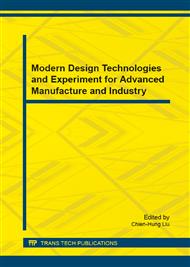[1]
F. Harmsen & M. Saeki: (1996).
Google Scholar
[2]
Sjaak Brinkkemper, Method engineering: engineering of information systems development methods and tools. Journal of Information & Software Technology, Vol 38, pp.275-280 (1996).
DOI: 10.1016/0950-5849(95)01059-9
Google Scholar
[3]
Bandinelli S., et al.: Modeling and Improving an Industrial Software Process. IEEE Trans. Soft. Engg (1995) 440-454.
Google Scholar
[4]
Bassili V et. al.: SEL's Software Process - Improvement Program. IEEE Software, 12(1995)83-87.
Google Scholar
[5]
Ralyté J; Deneckère R., Rolland C.: Towards a Generic Model for Situational Method Engineering, Proc. CAiSE 2003, Eder J. & Missikoff M. (eds. ) LNCS 2681, Springer, 95-110.
Google Scholar
[6]
D. Avison, D and G. Fitzgerald: Reflections on Information Systems Development 19882002, in: Information Systems Development - Advances in Methodologies , Components, and Management, edited by M. Kirikova, J. Grundspenkis, W. Wojtkowskiet (KIuwer Academic/ Plenium Publishers, 2002), pp.1-11.
DOI: 10.1007/978-1-4615-0167-1_1
Google Scholar
[7]
K. Kumar and R. J. Welke: Methodology Engineering: A Proposal for Situation-Specific Methodology Construction, in: Challanges and Strategies for Research in Systems Development Method, edited by W. W. Cotterman, J. A. Senn (John Wiley & Sons, 1992).
Google Scholar
[8]
Brinkkemper S: Method engineering: engineering of information systems development methods and tools. Information and Software Technology, 275-280, (1996).
DOI: 10.1016/0950-5849(95)01059-9
Google Scholar
[9]
Harmsen F.: Situational Method Engineering, Moret Ernst & Young, (1997).
Google Scholar
[10]
Olle, T.W., J. Hagelstein, I.G. MacDonald, C. Rolland, H.G. Sol, F.J.M. van Assche, A.A. Verrijn-Stuart, Information Systems Methodologies - A Framework for Understanding, 2nd edition, Addison-Wesley, 1991; Vessey, I., and R.L. Glass, Applications-Based Methodologies. In: Information Systems Management, pp.53-57, Fall (1994).
DOI: 10.2307/2583721
Google Scholar
[11]
Purba, S., D. Sawh, B. Shah: How to Manage a Successful Software Project - Methodologies, Techniques, Tools, John Wiley & Sons, New York, (1995).
Google Scholar
[12]
Parkinson, J.: 60 Minute Software – Strategies for Accelerating the Information Systems Delivery Process, John Wiley & Sons, New York, (1996).
Google Scholar
[13]
Harmsen, F., S. Brinkkemper, H. Oei: Situational Method Engineering for Information System Projects. In: Olle, T.W., and A.A. Verrijn Stuart (Eds. ), Methods and Associated Tools for the Information Systems Life Cycle, Proceedings of the IFIP WG8. 1 Working Conference CRIS'94, North-Holland, pp.169-194, Amsterdam, (1994).
Google Scholar
[14]
Bucher T., Klesse M., Kurpjuweit S. &Winter R.: (2007). Situational Method Engineering– On the Differentiation of Context" and "Project Type,. Situational Method Engineering 2007, 33-48.
DOI: 10.1007/978-0-387-73947-2_5
Google Scholar
[15]
Ralyté J; Deneckère R., Rolland C.: Towards a Generic Model for Situational Method Engineering, Proc. CAiSE 2003, Eder J. & Missikoff M. (eds. ) LNCS 2681, Springer, 95-110.
Google Scholar


